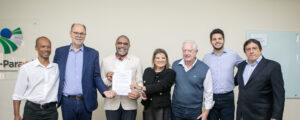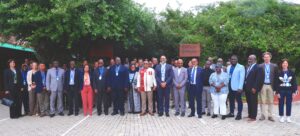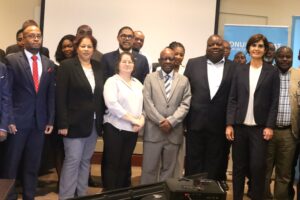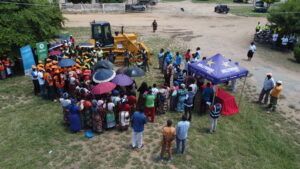
GLOBAL AGREEMENT TO PROMOTE A MORE RESILIENT WORLD
GLOBAL AGREEMENT TO PROMOTE A MORE RESILIENT WORLD June 6, 2025, 1:00 pm DiMSUR, Comoros, Madagascar, Malawi, Mozambique, South-South Cooperation COOPERATION WITH A GLOBAL PROFILE
December 16, 2020 , 6:25 am
DiMSUR News, Regional news

“In Grande Comore Island, communities organized themselves into associations for development projects with the aim of strengthening resilience, improving drainage of rainwater, and accessibility.”
– Mhoudine Sitti Farouata, Governor of Grande Comore Island, Union of Comoros.
“Key lesson from CityRAP in Mutare include the use of community mapping processes, focus group discussions inclusive across all groups, workshops and self-assessments,”
– said Joshua Maligwa, City Town Clerk, Zimbabwe.
“The best practices for building urban resilience in Eswatini include using off-grid renewable energy plans and building a transfer station for shipping hazardous waste in one confinement to reduce pollution,”
– Alice Russo, Matsapha Town Council Chairperson, Eswatini.

GLOBAL AGREEMENT TO PROMOTE A MORE RESILIENT WORLD June 6, 2025, 1:00 pm DiMSUR, Comoros, Madagascar, Malawi, Mozambique, South-South Cooperation COOPERATION WITH A GLOBAL PROFILE

DIMSUR – A RELEVANT ACTOR BUILDING RESILIENCE IN SOUTHERN AFRICA A Regional Workshop to showcase the successes of an ambitious project August 26, 2024, 1:00

DiMSUR´S TECHNICAL CAPACITY RECOGNIZED IN EAST AFRICA: ELDORET, THE CITY OF CHAMPIONS August 15, 2024, 3:00 pm DiMSUR, Kenya Eldoret, 15 August 2024 – On

Mozambican government launches process to draw up a Regulation for Urban Disaster Risk Management and Climate Resilience March 26, 2024, 3:00 pm DiMSUR, AF, Mozambique

Chókwè remains committed to its efforts towards Urban Climate Resilience March 13, 2024, 11:00 am DiMSUR, AF, Mozambique Chókwè, 06 March 2024 – The haunting
Headquarter in Maputo and Sub-Units in Member States
University Eduardo Mondlane Campus (UEM)
Julius Nyerere Avenue, #3453
Sciences Faculty – Physics Department, 2nd Floor
Maputo – Mozambique
Tel: +258 (84) 0531199
secretariat@dimsur.org |www.dimsur.org
